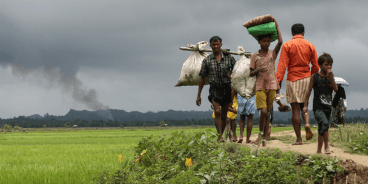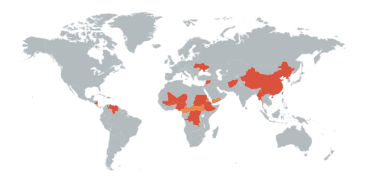Atrocity Alert No. 44: South Sudan and Myanmar
Atrocity Alert is a weekly publication by the Global Centre for the Responsibility to Protect highlighting and updating situations where populations are at risk of, or are enduring, mass atrocity crimes.
South Sudan
On 20 February three UN agencies and the government of South Sudan declared a state of famine in some parts of the country. At least 100,000 people are facing starvation while a further 1 million people are classified as “on the brink of famine,” with populations in Unity state most acutely affected. The UN estimates at least five million people will be food insecure by April. The UN Humanitarian Coordinator in South Sudan, Eugene Owuso, has blamed the government for the situation, noting that the famine is entirely “man made.” The food crisis in South Sudan is the result of years of pervasive insecurity, widespread civilian displacement, and regular attacks on humanitarian workers. Nearly three years of civil war have prevented farmers from planting and harvesting crops, and the delivery of food aid remains extremely dangerous and difficult.
The declaration of famine comes at a time of renewed fighting between the Army (SPLA) and armed rebels in several parts of the country. Three senior military officials recently resigned after accusing the SPLA and the government of committing and condoning war crimes and crimes against humanity, including the ethnic targeting of civilians.
In August 2015 the government and representatives of the rebel SPLA-IO signed a peace agreement to end South Sudan’s 2013-2015 civil war. Given the failure of the government to assist in the expeditious deployment of the Regional Protection Force, or to uphold its obligations under international law, the UN Security Council should immediately impose an arms embargo and targeted sanctions against senior military figures from both the SPLA and SPLA-IO who are implicated in ongoing violence.
Myanmar (Burma)
On 16 February the government of Myanmar announced an end to its four-month “clearance operation” in northern Rakhine state. During the operation, which began on 10 October 2016, the security forces perpetrated systematic attacks against Rohingya civilians, including extrajudicial executions, rape and torture, which may amount to ethnic cleansing and crimes against humanity.
The UN Special Rapporteur on the situation of human rights in Myanmar, Ms. Yanghee Lee, is currently on a 3-day visit to Bangladesh, where she is meeting with Rohingya refugees as well as Bangladeshi officials, to discuss the humanitarian situation. According to the UN, between October 2016 and 20 February an estimated 73,000 people have crossed from Rakhine State into Bangladesh. While welcoming the announcement that security operations had ceased, Special Rapporteur Lee warned that “we cannot forget the numerous allegations of grave human rights violations.”
An international independent investigation into allegations of widespread and systematic human rights abuses in northern Rakhine State should be urgently established. On 16 February the Global Centre for the Responsibility to Protect joined seven other organizations in calling upon UN Secretary-General António Guterres to personally engage with the government of Myanmar regarding possible atrocities committed in Rakhine State and the ongoing plight of the Rohingya.
Read Next
Related Publications

Atrocity Alert No. 422: Sudan, Myanmar (Burma) and the Democratic Republic of the Congo

Atrocity Alert No. 420: Myanmar (Burma), Syria and Forced Labor
